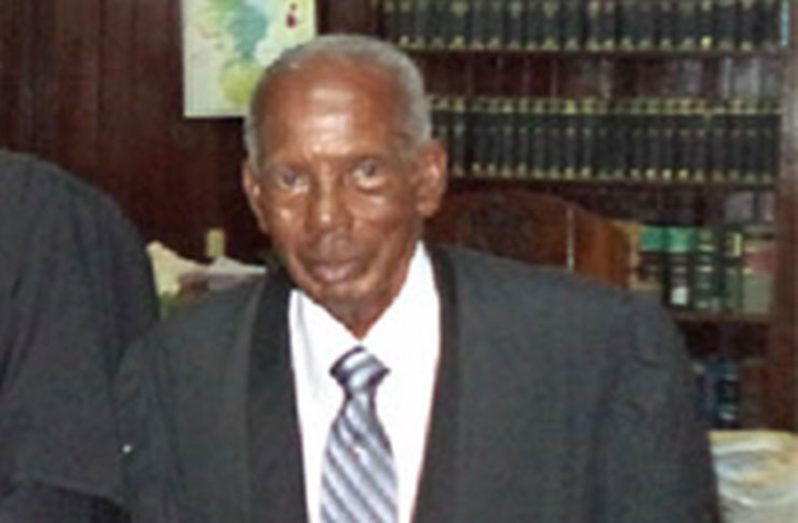Former Chancellor of the Judiciary Keith Massiah has concurred with Justice Duke Pollard that the ruling in the third term case is flawed and that there is no need for a referendum to effect the changes that were made to the Constitution to implement presidential term limit here.
Massiah SC in a Letter to the Editor contended that Act No. 17 of 2000 does not offend or infect either Article 1 or 9 of the Constitution, but speaks to the sovereignty of the people.
On February 23, the Court of Appeal by a 2-1 majority upheld the ruling of the High Court which stated that the Constitutional amendment, Act No. 17 of 2000, which limits the number of times a person can be elected as President is unconstitutional.
The ruling by the Court of Appeal has paved the way for a former President, even after having served two terms in office, to stand for elections on a list of representatives as the presidential candidate for an unlimited number of terms.
The Court of Appeal judges, Justice Carl Singh and Justice B.S. Roy voted to uphold the ruling of the High Court, while acting Chief Justice Yonette Cummings-Edwards was the only dissenting voice.
Justice Singh in his ruling said the decision to limit presidential terms should have gone to the electorate by way of a referendum, and not be decided upon by the National Assembly.
However, Justice Cummings-Edwards did not agree with Justice Chang’s ruling, and argued that such a referendum would mean that the electorate would be granted the power to make amendments to the Constitution.

“I write in respectful concurrence with Justice Duke Pollard’s crystalline analysis of the issues bearing on the question of the presidential term limit. The matter is constitutionally important and seemingly will reach the Caribbean Court of Justice for final determination,” Massiah SC said.
He said of importance is Justice Pollard’s reference to, and use of Dr. Bennion’s classic ‘Statutory Interpretation’ as a clarifying agent.
Justice Pollard had quoted Francis Bennion, a leading exponent of constitutional interpretation in the international legal fraternity, who said that: “A statutory term is recognised by its associated words. The Latin maxim noscitur a sociis states this contextual principle, whereby a word or phrase is not to be construed as if it stood alone, but in the light of its surroundings.
While of general application and validity, the maxim has given rise to particular precepts such as the ejusdem generis principle and the rank principle.” (Francis Bennion, Statutory Interpretation, 4th Edition, at p. 1049)
And according to Massiah SC, it is the jurisprudence deriving from Bennion, particularly the bearing of associated words on statutory terms, that led Justice Pollard to the conclusion that articles 1 and 9 of the Constitution refer to “a unified political entity” and not to “constitutional entitlements of the people” as wrongly conceived by Chief Justice Chang and the “divergent majority” in the Court of Appeal.
In addition, the former attorney general and chancellor of the judiciary affirmed his support of Justice Pollard’s reasoning, noting that “What eventuates beyond all question is that Articles 1 and 9 (the alteration of which requires referenda in keeping with article 164) have not been touched by the impugned amending provision (Act 17 of 2000), which prescribed the two term presidential limit. If Justice Pollard and I are correct then questio cadit – the matter of a referendum is irrelevant.”
Meanwhile, Justice Pollard in an article published in the Guyana Chronicle on March 18, titled “Misinterpreted -Justice Pollard differs on third-term ruling”, said the validity or constitutionality does not depend on the favourable outcome of a referendum.
Just before the May 2015 General and Regional Elections, a resident of Georgetown, Cedric Richardson, who many believe was used by Opposition Leader Bharrat Jagdeo, who from all appearances is seeking a third term as president, challenged the amendments made to Article 90 of the Constitution that were enacted in 2000 following a bipartisan Constitutional Reform Process.

Attorney General and Minister of Legal Affairs, Basil Williams, has indicated that he will be appealing the decision at the Caribbean Court of Justice (CCJ); however, attempts to serve the Notice of Application and Affidavit in Support of Application for leave to appeal to the CCJ to Richardson has proven futile.
In a statement last week by the AG chambers, Office Assistant Shaun Mearns visited Richardson’s known place of abode located at Lot 4, West Ruimveldt on March 17 but was told by a female that Richardson does not reside there.



.jpg)











